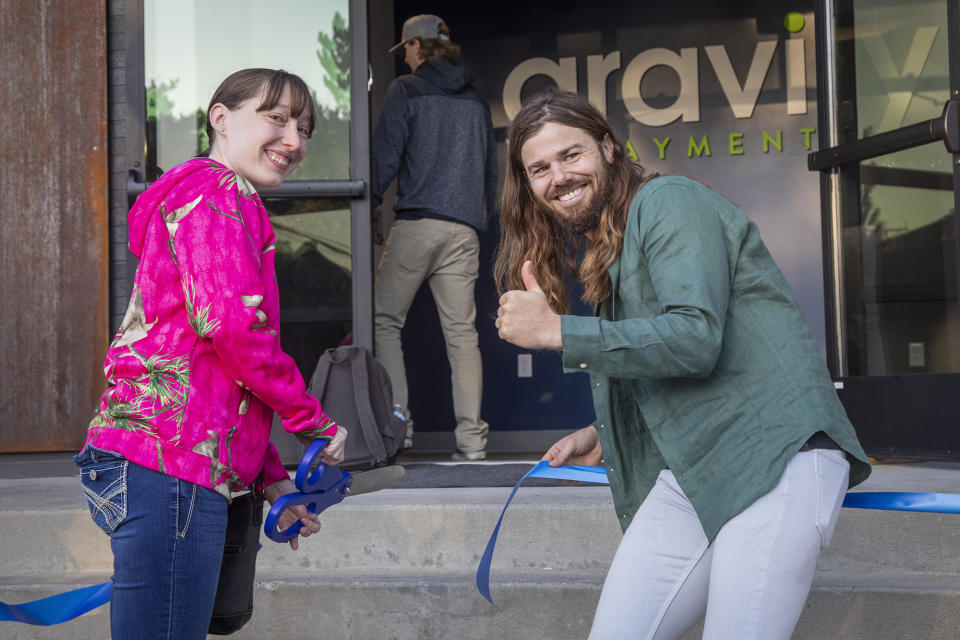'Losing $50,000 a day': This company's workers took voluntary pay cuts to prevent layoffs
Five years after Gravity Payments CEO Dan Price slashed his million-dollar salary to pay his staff more, his employees are doing the same — voluntarily — to save each other’s jobs at the Seattle-based credit card processing company that’s been hit hard by the economic shocks from the pandemic.
“We were losing on average, about $50,000 per day, or $1.5 million a month,” Price told Yahoo Money. “We had literally three to four months to survive.”
To get through the tough times, he turned to his 220 employees for a solution. Their first idea: Take a voluntary pay cut based on their individual financial situation. Some could afford just a 5% reduction, while others took 30% to 50% less. Additionally, 10 employees asked to go without pay through the crisis.
“We had 98% of the company just step in,” Price said, “without any kind of overall mandate from the top.”

‘Not a good time to be laid off’
The sacrifices by Gravity Payments employees comes as companies of all sizes are facing major revenue shortfalls. Many employers are turning to massive layoffs and furloughs to trim costs. About 10 million workers have sought unemployment benefits in the last two weeks alone.
At Price’s company, he would have needed to lay off 20% of his staff, or 45 people, to make it through the crisis.
“It's not a good time to be laid off,” he told Yahoo Finance. “It's not a good time to be losing your job.”
He also considered raising prices by $20 per customer to generate the additional $400,000 the company needed. But Gravity Payments works primarily with small businesses that are also hurting during this time and he didn’t want to add to their burden. Additionally, he would need to attract 15,000 new clients to recover from the crisis.
‘Put that money back into the company’

Price knew that he and his employees made the right decision for the company and he advises other CEOs to consider similar moves. Large companies should go to their shareholders, boards, and management and ask for some of the money they’ve gotten during good times to help weather these difficult ones.
“Take that money that you've gotten through stock buybacks, through dividends, through executive compensation,” he said. “You need to put that money back into the company, so that we can avoid layoffs.”
Layoffs can be a short-term solution, but can result in losing valuable employees in the long run, according to Amber Clayton, the knowledge center director at SHRM, a human resources membership association. Those who are laid off may not return to the employer.
Read more: What to do before you lose your job
Instead, keeping employees engaged in the workforce and asking for input on how to deal with the current crisis can be a better option, Clayton said.
“Anytime employees are laid off, it can be diminishing to morale,” Clayton said. “It's actually going to be better for the organization overall, you're going to have more commitment from employees [because their] organization is working with them on the alternatives to just letting them go.”
A million dollar pay cut
Price has also cut his salary to zero during this time to help the company and his employees. But it isn’t the first time he slashed his pay.

In 2015, he made headlines when he hacked his salary from $1.1 million to just $70,000 and guaranteed a minimum wage of $70,000 a year for all his employees.
Since then his workers went from having two babies a year to 50 babies a year. Seventy percent of them reported they've been able to pay down debts. They also have doubled or tripled their retirement savings.
“In my 20s, I went from having nothing to being a multimillionaire,” Price said. “And in my 30s, I added nothing to my net worth. If anything, it went down, and I was happier, healthier, more well than I'd ever been before, and our employees were just flourishing.”
Denitsa is a writer for Yahoo Finance and Cashay, a new personal finance website. Follow her on Twitter @denitsa_tsekova.
Read more:
'I may lose everything': Americans reel from job losses as coronavirus stalls economy
What to do if you lose your health insurance during the coronavirus outbreak
Read more personal finance information, news, and tips on Cashay
Follow Yahoo Finance on Twitter, Facebook, Instagram, Flipboard, SmartNews, LinkedIn, YouTube, and Reddit.

 money
money 
